Slightly more Americans prefer President Joe Biden’s plan for infrastructure than the Republican plan, according to a new poll. Also, most of the people polled voiced support for funding any package through raising corporate taxes, as opposed to the GOP-backed idea of funding upgrades to the nation’s infrastructure through user fees, which would affect everyone, including low-income working people.
Negotiations between Biden and a group of Republican lawmakers, led by Sen. Shelley Moore Capito (R-West Virginia) broke down this week after the latest offer from Capito failed to “meet the essential needs of our country,” White House Press Secretary Jen Psaki said on Tuesday. Instead, Biden will now plan to meet with a bipartisan group of lawmakers, composed of both Democratic and Republican senators, in order to negotiate on a bill that can be passed in a bipartisan manner to avoid a Senate filibuster.
Biden has also asked Senate Majority Leader Chuck Schumer (D-New York) to look into using budget reconciliation in the Senate in case a bill has to be passed without any Republican support, which seems more than likely.
“The President is committed to moving his economic legislation through Congress this summer, and is pursuing multiple paths to get this done,” Psaki also said.
A Politico/Morning Consult poll published on Wednesday morning suggests that Biden’s decision to move in this direction would be the better path to take as it would be preferred by American voters overall.
Two-thirds (66 percent) of voters agree that an infrastructure bill should be a “top” or “important” priority, with only 21 percent saying that it’s “not important” or “shouldn’t be done” at all, the poll found.
Between the two plans being offered by the two parties, there is slightly more support for Biden’s original plan, which involves spending $2.3 trillion on infrastructure projects. Fifty-two percent of voters back that idea, while just 34 percent are opposed to it.
Conversely, the Republican plan that Capito had been offering, which would limit spending to around $1 trillion with just $330 billion in new spending, garnered the support of 48 percent of Americans, with 30 percent voicing opposition to it.
One of the main sticking points in the negotiations rested on how to fund an infrastructure bill, with Democrats and Biden pushing for higher taxes on corporations and Republicans preferring to shift unspent COVID-19 economic recovery dollars and possibly implementing infrastructure user fees to pay the tab.
Voters in the Politico/Morning Consult poll rejected the latter idea, and voiced more support for taxing corporations at higher rates. Currently, the corporate tax rate sits at 21 percent. According to the poll, 50 percent of voters back raising that rate to 25 percent with only 32 percent opposing it, and a plurality of voters (47 percent) say they would even support raising the corporate rate to 28 percent (with 35 percent opposing the idea).
Cutting back on corporate tax loopholes, too, appears to have strong support, with 57 percent of Americans saying they would back a minimum corporate tax of 15 percent in order to help pay for infrastructure.
There’s no reason not to consider both options, however, as raising corporate taxes and getting rid of tax loopholes are not mutually exclusive ideas. Indeed, numbers published just a few weeks ago from a Data for Progress poll indicated that 63 percent of Americans felt that the best way to fund an eventual infrastructure plan was to make corporate taxation fairer overall.
That poll also found that most voters felt Republicans, not Biden, should be more willing to budge on negotiations when it came to the final bill. Fifty-five percent of those taking part in the Data for Progress poll said Republicans should find “ways to work” with the president, versus just 40 percent who said Republican lawmakers should work to “keep Biden in check” when it comes to infrastructure talks.


